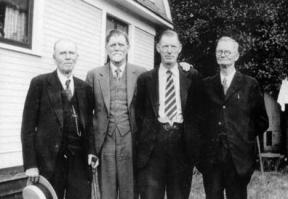Imagine if 4,000 to 5,000 people camped for a week at Maxwelton Park.
It may sound like a military invasion or rock festival, but in fact, this campout actually took place on an annual basis from 1910 through 1915.
Known as a Chautauqua — pronounced “sha-talk-wah” — the event drew families from Coupeville, Everett, Seattle and Tacoma to spend a week on South Whidbey.
Many traveled from the mainland by steamship and landed at the Maxwelton pier, which no longer exists. Many brought their own camping gear, while others rented tents from the organizers.
Before television and radio and before the country was wired into the Internet, Chautauqua encampments provided a form of mass communication where ideas were exchanged.
Information and photos on this bit of history are the latest addition to the South Whidbey Historical Society Museum in Langley.
“Can you imagine the fun and excitement at these events with all those people?” said Joanne Hannah, spokeswoman for the museum.
“I think this part of Whidbey’s history is not well-known and would be of general interest,” she said recently.
The event was not limited to Whidbey Island. The Chautauqua movement began in 1874 in Chautauqua, New York with the founding idea to provide a place where families could gather together for several days of education, inspiration, enlightenment, and enjoyment.
The idea quickly spread and Chautauqua assemblies formed throughout the country and in India and China, with lectures, discussions, and cultural activities lasting several days to a week in a resort atmosphere.
Some Chautauqua events were more strictly structured than others. Woodstock they were not. The Maxwelton event was one of the more conservative incarnations of Chautauqua.
“Make no mistake about Maxwelton’s Chautauqua activities,” Hannah said, “they were good, clean fun with Bible study and preachers often included in the programs.”
But there were recreational activities such as baseball games, an all womens’ orchestra, and a glee club. A group of musicians would even meet the incoming participants at the dock.
Five brothers from one of South Whidbey’s early families, the Mackies, brought Chautauqua to the island. Peter Howard, Dave, Theodore and Herbert Mackie donated the land at Maxwelton beach for the event. Peter Mackie supplied the lumber for a grandstand, which was built below the Swede Hill bluff to seat about 5,000 people. The Mackies along with 19 other South Whidbey families hosted assemblies for six year.
It all seems so big for the little beach area and is difficult to imagine without the photos on display at the historical museum. Some of the photos in the exhibit were donated by the late Joan Mackie Reese, a granddaughter of one of the Mackie Brothers. The new exhibit is dedicated to Reese and the other children and grandchildren of the five brothers.
The Maxwelton Chautauqua was halted when a big snowstorm in 1916 caused the roof an amphitheater at the beach to collapse. It was never rebuilt, and the people who attended Chautauqua never came back.
But while it lasted, the event was popular. The Mackies advertised their Chautauqua in Seattle Post-Intelligencer and described the setting as having a “bathing beach where a quarter mile of clean white sand is exposed at high tide.”
Their ad also described a “forested bluff that provides a backdrop to a three-quarter-mile long strip with tenting spots…”
At a modern-day Chautauqua, the Iraq war and the economy might be discussed. But shortly after the turn of the 20th century, women’s suffrage was the hot topic at the Maxwelton Chautauqua. Guest speakers included Nebraska Congressman William Jennings Bryan, who was a three-time presidential candidate and later served as secretary of state under President Woodrow Wilson.
Not much is left of the old-time Chautauquas. No evidence remains at Maxwelton Beach, though the community does hold a big get together every July Fourth that brings a crowd almost as large as that attracted by the Mackie brothers nearly a century ago.
Original Chautauqua sites still exist in Chautauqua, N.Y., and in Boulder, Colo.
In its heyday early in the 20th century, there were 21 traveling Chautauqua companies operating on 93 circuits. Up to 35 million people a year participated.
At the turn of the 20th century, Theodore Roosevelt was so taken by the democratic value of the original Chautauqua, he was reported to say, “The Chautauqua is the most American thing in America.”



